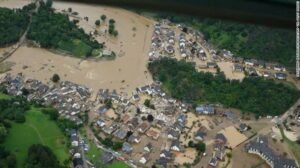Germany’s flood crisis pushes climate change to election centre stage
 The deadly floods that have engulfed large parts of western Germany this week have propelled climate change to the centre stage of the nation’s September election campaign.
The deadly floods that have engulfed large parts of western Germany this week have propelled climate change to the centre stage of the nation’s September election campaign.
German party leaders across the political spectrum have seized on the floods, the days of torrential rain and a recent bout of high temperatures to call on the nation to face up to the challenges of global warming.
Armin Laschet, the current conservative frontrunner seeking to succeed Chancellor Angela Merkel in the September 26 election, blamed global warming for the unprecedented flooding and torrential rainfall.
Laschet, who is also North Rhine Westphalia premier, appeared to play down the consequences of the climate change several years ago.
But on Thursday, during a tour of the devastated region, he declared: “We will be faced with such events over and over, and that means we need to speed up climate protection measures… because climate change isn’t confined to one state.”
Merkel plans to step down after September’s election after 16 years in power.
Meanwhile Social Democrat (SPD) chancellor candidate Olaf Scholz abandoned his vacation and also travelled to the flooded region and expressed shock at the “tremendous destruction caused by nature.”
Scholz said the natural disaster unfolding in western Germany “certainly also has something to do” with the fact that climate change is progressing rapidly.
Green Party chancellor Annalena Baerbock also broke off her summer vacation and returned to the campaign trail. Her party has traditionally benefitted from greater attention to the environment after natural catastrophes.
Support surged for the Greens after Japan’s Fukushima nuclear disaster in 2011.
The accident also forced Merkel to abandon her strong support for nuclear power and hijack the Greens’ anti-atomic energy stance and pursue more alternative energy sources for Europe’s biggest economy.
Several weeks later, Winfried Kretschmann became the nation’s first Green Party state premier after defeating Merkel’s Christian Democrats (CDU) in what was once a traditional CDU heartland, the south-western state of Baden-Wuerttemberg.
This time, Baerbock and the Greens might benefit if the horrors of this week’s crisis and rising death roll help election campaigns to focus more on climate change, election researcher Frank Brettschneider told dpa.
In particular, greater awareness of global warming could help Baerbock and the Greens rebuild their electoral hopes after opinion polls showed a slump in support following a slew of negative reporting about Baerbock.
But the deaths and cataclysmic pictures emerging from the states of North Rhine Westphalia and Rhineland-Palatinate and neighbouring countries are also a reminder of the crucial role the 2002 floods played in the elections of that year.
At the time, former chancellor Gerhard Schroeder – famously clad in rubber boots – personally intervened, as equally devastating floods wreaked havoc in Germany’s east that August.
It helped Schroeder turn a tight election race into a narrow victory for his SPD-led government in the election one month later.
Since then, global warming has become a broader political issue in Germany, in particular following a string of national disasters such as the devastating bushfires in Australia and the United States, as well as a series of powerful storms.
The issue is already shaping Germany’s global alliances.
This week, as Merkel visited Washington, Germany and the United States agreed on an energy and climate partnership to expand what she described as future-proof technologies such as hydrogen or renewable energies.
